One of the most intriguing things of the think tank phenomenon is to determine if these research and policy action units have a real influence in the development of politics. In fact, most of them assure that they have a certain persuasive power over the decisions of government. It is the suppossedly main proof they offer when trying to justify their existence and in the funding process. However, due to the lack of systematic research on the think tank activities and the youngness of many institutes, it is still difficult to draw consistent conclusions about the topic.
 One of the main influences think tanks claim, specially American and British laboratories, is that they have been the key inspirers of the privatisation policies that started in the United Kingdom an the United States in the 1980’s and extended to the whole Western World during the following twenty years. Think tanks like the Institute of Economic Affairs, Heritage Foundation and even the smaller Centre for Policy Studies could have a role in the setting up of the privatisation policies. It is known that Margaret Thatcher and Keith Joseph were among the founders of the CPS and that had close links to the IEA. In the American case, there is evidence that Officials of the Reagan’s Presidency were close to the Conservative think tanks.
One of the main influences think tanks claim, specially American and British laboratories, is that they have been the key inspirers of the privatisation policies that started in the United Kingdom an the United States in the 1980’s and extended to the whole Western World during the following twenty years. Think tanks like the Institute of Economic Affairs, Heritage Foundation and even the smaller Centre for Policy Studies could have a role in the setting up of the privatisation policies. It is known that Margaret Thatcher and Keith Joseph were among the founders of the CPS and that had close links to the IEA. In the American case, there is evidence that Officials of the Reagan’s Presidency were close to the Conservative think tanks.
But relationships and trails are not enough to explain the presumed influence. We need records or meeting memos in order to demonstrate the real influencing power of the big think tanks. Luckily, we are making the first steps as several historians have begun to investigate the path of think tanks in Government cabinets. It suggests that the study of privatisation process can give an excellent material to position better the role of these shadow politicians. British academics like Andrew Denham and Mark Garnett have studied the issue and published works like Keith Joseph, Think Tanks of the New Right. Also we have historical studies of American researchers as James A. Smith, who wrote Idea Brokers: Think Tanks And The Rise Of The New Policy Elite
But I am sure that analysis of think tanks and public policy is going to change with the publication of The Official History of Privatisation by David Parker. Parker was commissioned by past Primer Minister Tony Blair «to write the history of privatisation in Britain, as part of the program of Official Histories managed by the Cabinet Office». I have not still read the book as I have know its publication today, but I hope to read in the next weeks.
As a press release of the IEA says, «the brief was to review the evolution of the privatisation programme from May 1979 to May 1997. He was also asked to review the years leading up to 1979 and especially from 1970 to better understand the program’s origin and context. Prof Parker was given access Prime Ministers’ papers held in the Cabinet Office, Cabinet papers and Cabinet Committee papers and Departmental Records». It is the first time a researcher has had access to those documents and it makes a difference with previous research.
As the summary of the book describes, the work wants to answer to several questions:
“To what extent was privatisation a clear policy commitment within the Thatcher Governments of the 1980s? What determined the sequencing of the privatisations? What were the privatisation objectives and how did they change over time? How was each privatisation planned and executed? How were the different City advisers appointed and remunerated and what precise roles did they play? Were assets deliberately sold at a deflated price? How was each privatisation administered within government and in what ways did the methods evolve and change? What was the input of the Treasury and Bank of England, and what was the relationship between ministers and civil servants? Finally, in what ways did the management of the nationalised industry shape the content and timing of the privatisations?”
Let’s read and discover the solution to the misterious influence. Or not.

Deja una respuesta